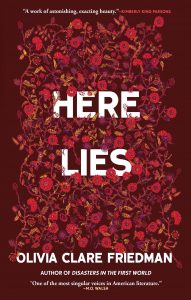Culture
In the future of ‘Here Lies,’ the mourning can’t bury their dead
By: Kristen Martin | NPR
Posted on:
WASHINGTON, D.C. (NPR) — The Louisiana of Olivia Clare Friedman’s debut novel Here Lies feels familiar at first. Roadside stores in the fictional small town of St. Genevieve sell Pop-Tarts, Little Debbie snack cakes, Abita Purple Haze beer. Reruns of Matlock and Perry Mason air on daytime television.

In 2042, everyone must report deaths to the government, who send “Angels of the State” to collect bodies for mandated cremation. Burial of any kind is illegal under federal law. Cemeteries are shuttered, left to go to seed. The state keeps urns filed away by alphanumeric code in storage units that the grieving cannot visit.
This cruel bureaucratizing of death forms the backdrop to 22-year-old Alma Lee Guidry’s journey to reclaim her right of sepulcher. When the novel opens, her single mother Naomi is six months dead of ovarian cancer. Naomi lived all her 53 years in the same house; before her death, she told Alma to “complete the circle” — if she couldn’t be buried in a cemetery, she wanted to be buried in their yard. Alma found that though she could tend to her mother’s dying body, she could not handle the fact of her dead body. She called the Angels of the State. Now, suspended in sadness but unable to properly grieve in the crumbling family home where the dampness is like “another soul,” Alma begins the process to reclaim her mother’s ashes. It’s a loophole allowed to people who lose their “only next of kin.”
This set-up allows Friedman — a poet and short story writer known for exploring moments of vulnerability — the opportunity to elegantly drive home the importance of rituals for “loving the dead with the diamond of the living.” But it’s a shaky premise. While Americans now largely treat death and mourning as topics to be acknowledged only through glancing euphemisms, the idea that the first step that a future U.S. government would take to combat climate change would be banning burials seems incongruous with human history. As historian Thomas W. Laqueur writes in The Work of the Dead: A Cultural History of Mortal Remains, his seminal work on how the living imbue their dead with immense meaning, “as far back as people have discussed the subject, care of the dead has been regarded as foundational — of religion, of the polity, of the clan, of the tribe, of the capacity to mourn, of an understanding of the finitude of life, of civilization itself.”
In Friedman’s 2042, the government has robbed Americans of this foundational rite, and is preparing to also forbid wakes, funerals, and memorials — and to dig up and cremate previously buried human remains. I kept waiting for further world-building to anchor Friedman’s premise, to explain why a culture would become so hostile to mourning rituals, to make the climate change logic of closing graveyards make sense. But aside from more extreme weather and barer store shelves, the U.S. of 2042 is essentially the same as the U.S. of 2022, down to laws that ban abortions after six weeks of pregnancy — in Alma’s mind, both these laws and those banning burial are simply about taking away people’s choices.
Its flawed foundation notwithstanding, Here Lies provides a poignant portrait of the way grief can bring people together, uniting even strangers through a common pain and commitment to keep their loved ones alive in memory. When Alma heads to the library to comprehend the red tape she must duck under to possess her mother’s remains, she meets Bordelon, a 19-year-old who is similarly unmoored in her mourning. After the death of her grandmother Beatrice — her only next of kin — Bordelon also lost her home, and is living out of a hatchback crowded with the detritus of the past. Alma invites her in to shelter from the latest storm, and soon they are “kicking and living together,” providing ballast to one another as they move forward in this hard place that refuses to name what they have lost.
Compassion is scarce here, and certainly doesn’t come from the government worker manning the urn claims desk at the Office of the Parish Clerk, who sullies Naomi’s birth and death certificates with condensation from his Mountain Dew can. As Alma persists in her quest to possess what is left of her mother with Bordelon by her side, she finds that it is two older women — Pegeen, a librarian, and Josephine, a notary, similarly alone in this world — who are willing to offer her grace, teach her how to both fight against inhumanity and “stay humble, stay light,” and act out of hope that things that seem impossible can be accomplished.
This is a novel that pays rapt attention to the natural world, and the persistence of flora — from the thick “overbloom” of wildflowers that explode from all the rain to the “swollen fruit” of a fig tree in Josephine’s barely tamed garden — provides one site of hope. The trees that improbably survive repeated storm lashings are of particular respite. Alma and Bordelon bask in the feeble shade of “frail, short live oak clinging to life.” They pull over on a two-lane highway, drawn in by a “bold crepe myrtle, stark against the weeds, blooming alive with fuchsia,” a tree that asserts itself “like a rising flame, a flowering sword.” Even in this place where “we’d turned against the earth that now turned against us,” where the struggle for survival has caused the country to turn its back on what made it a civilization, there is some beauty and mercy left.
Kristen Martin is working on a book on American orphanhood for Bold Type Books. Her writing has also appeared in The New York Times Magazine, The Believer, The Baffler, and elsewhere. She tweets at @kwistent.
9(MDU1ODUxOTA3MDE2MDQwNjY2NjEyM2Q3ZA000))

